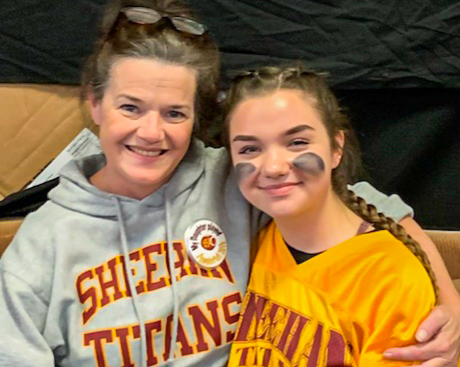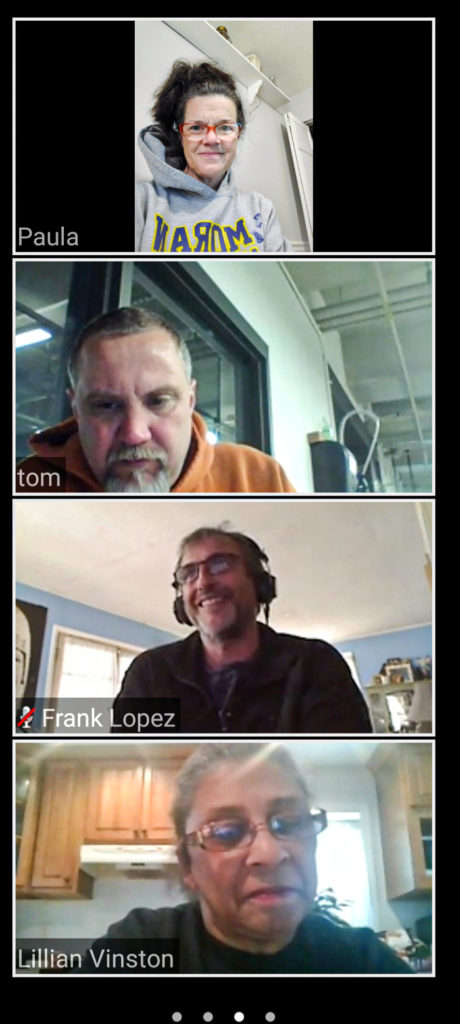
Courtesy of Paula Farnsworth
“I see the profiles of the professor and of the student in Asia,” Paula Farnsworth, senior administrative assistant in the Physics Department, said about the News’ profile series. “And I think, ‘Oh my, why would they want to interview a staff member?’ But I guess it does take us all to make Yale go round.”
Farnsworth went on to make other similar comments throughout our interview, seemingly unaware of just how impressed the people around her are with her ability to help make Yale go round. In normal times, Farnsworth supports the relativistic ion group within Yale’s Physics Department, conducting research projects, completing purchase orders and coordinating travel for the group’s 12 members. At home in Wallingford, Connecticut during the pandemic, Farnsworth balances her usual work for the Physics Department with single motherhood and delivering groceries to neighbors.
Though Farnsworth said her schedule working from home is “anything but structured,” her two cats serve as reliable alarm clocks, waking her up early each morning. At 8 a.m., she begins her workday by checking her email inbox.

The COVID-19 pandemic has altered Farnsworth’s usual work as her group works within the Wright Laboratory. The group focuses on two undertakings — working with ALICE, an experiment to detect a novel phase of matter called quark-gluon plasma by replicating in a laboratory conditions like those just after the Big Bang, and ATLAS, a machine the size of a seven-story building which detects particles created by proton collisions — located in Geneva and Long Island, respectively. Ordinarily, Farnsworth coordinates professors’ travel between the two locations and completes expense reports from their trips.
But now there are far fewer events to plan and trips to arrange, so Farnsworth has turned to projects she had kept on the “back burner” for years. She is developing a new website for the group and compiling a list of awards the faculty members may be eligible for. And since she has been with the Wright Lab for 18 years, Farnsworth said she is serving as a source of “institutional memory” for an undergraduate who’s creating a list of everyone who received a PhD from the lab.
Farnsworth is accustomed to working from home, having only been back in the office for two months following three months of recovery from mitral valve surgery with unexpected complications. She acknowledges the challenge of these health issues, but looks on them as a source for gratitude for her life.
“I am in a unique position to really just appreciate that I have a job, and we’re still here and we’re still healthy and that I’m at home but I’m not recovering from major surgery,” Farnsworth said about the pandemic.
Farnsworth is a single mother to Jayden, a high school senior. In the past few weeks they have lost two family members that were in their 40s. Though she noted the recent hardships her family had faced, she explained they allowed for brighter times — connecting with extended family over FaceTime to help grieve the loss.
In the aftermath of her surgery, Farnsworth’s neighbors brought meals and cookies to her door, and checked in on her as she recovered.
Now, she’s returning the favor. Five weeks ago, Farnsworth asked her neighbors if she could pick up milk or eggs for them. Nowadays, Farnsworth does the grocery shopping for five families in her condo complex, including her 70-year-old neighbor. She dons gloves and a mask to deliver the food and check in on everyone.
“Seeing the smiles on people’s faces and their gratitude, it just really warms my heart,” Farnsworth said.
When asked her favorite food to cook while in quarantine, Farnsworth blurted out, “Grubhub,” with a warm laugh. “I can tell you every restaurant within a ten-mile radius that’s open right now.”
But when she does cook, she makes enough for her neighbors, sharing pancakes and bacon with the people in her condo complex.
Physics professor John Harris called Farnsworth the best assistant he’s worked with in his nearly 25 years at Yale.
“She gets it all done,” Harris said. “Aside from her being conscientious and getting things done … she’s also no-nonsense and she will be direct, but in a nice and friendly way.”
The stay-at-home orders have changed the way Harris and Farnsworth communicate. Though they still check in on each other’s well-being, they no longer have the short morning conversations the two would share when Harris arrived for work.
The group still communicates a few times a week over Zoom. The group-wide Zoom meetings are rife with comical moments — from rogue pets running across the screen to graduate students posing a seal-shaped pillow named Gregor with their quantum theory textbooks.
“You finally kind of get to see the human side of people, which we don’t get to see a lot at work,” Farnsworth said.

The photos of Gregor serve an important purpose — each day, group members respond with emojis as a safety check to signify they are alright.
Farnsworth noted that she’s content with the quieter life amid the pandemic. She watches the news, finding comfort in Dr. Fauci’s straightforward press briefings and anguish at the President’s contradictory messages.
“I don’t feel a void to fill,” Farnsworth said. “My cats keep me busy” — the grey Sir Winston, so named “because he’s royalty,” and the black Butero, whom Farnsworth and her daughter call “Bootie.”
“One of them’s insane,” she said with a laugh. “He likes to play fetch, and the other supervises because he’s much too important for things like that.”
Rose Horowitch | rose.horowitch@yale.edu
This story is part of a larger series profiling Yale and New Haven community members during the COVID-19 pandemic. To read more, click here.







